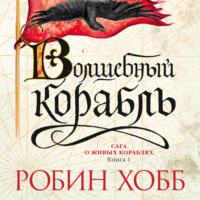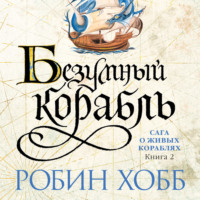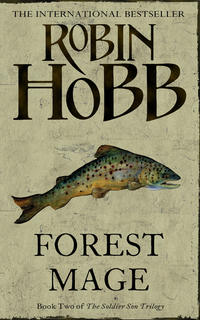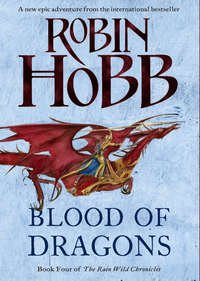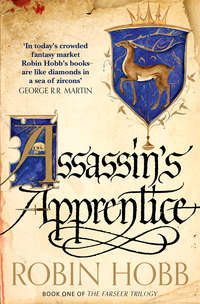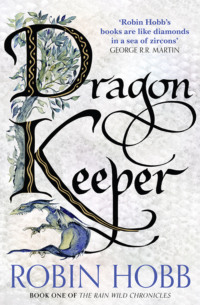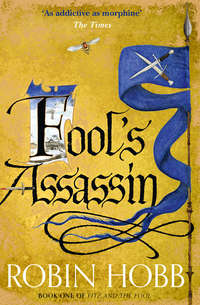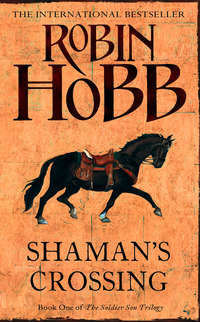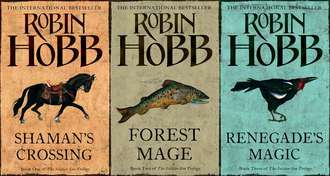
Полная версия
The Complete Soldier Son Trilogy: Shaman’s Crossing, Forest Mage, Renegade’s Magic
For myself, I most enjoyed our afternoon class in Engineering and Drawing. Captain Maw seemed to me to be an even-handed instructor who paid no attention to Old Noble or New Noble differences. He seemed genuinely fond of Spink who made great efforts in our class, but I quickly became something of a favourite with him as well. My tasks on my father’s holding had given me a generous dose of practical engineering. I glowed with pride on the day that Captain Maw referred to me as ‘a muddy-boots engineer like myself’ meaning that my skills had come to me with practice rather than from books. He often enjoyed setting us tasks that demanded non-standard solutions, and he often threatened us that ‘there may come a time when you must throw up earthworks without shovels or create a bridge without lumber or worked stone.’
I distinguished myself one afternoon by constructing a model of a raft built from ‘logs’ and string alone. Captain Maw created a set of rapids on a water table from a bucket of water poured down a ramp. Mine was the only raft to successfully negotiate the rapids and bear its cargo of lead soldiers to a safe landing at the bottom. I earned high marks for the class that day and was still flushed with success when he asked me to stay behind.
After the others had departed, and we were left alone to tidy away the rafts, soldiers and buckets, he shocked me by asking me solemnly, ‘Nevare, have you ever considered becoming a cavalla scout?’
‘No, sir!’ I replied in quick and honest horror.
He smiled at my disdain for the position. ‘And why is that, Cadet Burvelle?’
‘Because I, well, I want to be an officer and distinguish myself in service to my king and make my family proud of me and …’
My words dribbled away as he cut in quietly with, ‘And you could do all that as easily as a scout as you could as a lieutenant in uniform.’ He cleared his throat and spoke quietly, as if sharing a secret with me. ‘I know a number of good men stationed in the border forts. A recommendation from me would take you far with them. You wouldn’t have to remain here at the Academy with your nose shut in a book for most of the day. Six weeks from now, you could be free and on the open land, serving your king.’
‘But, sir!’ I halted, realizing that I should not argue with an officer, nor even offer an opinion until he sought it.
‘Speak freely,’ he encouraged me. He went back to his desk and sat down. As I spoke, he toyed with a small model of a catapult.
‘Captain Maw, a scout does not have the status of a regular officer. He commands no men save himself. He operates alone. Often he is a ranker or a man disowned by his family. They are expected to know the conquered folk intimately, their language, their habits … Sometimes scouts even take plains wives and have children with them, and only come into the forts sporadically to report for duty. They are not … they are not gentlemen, sir. I am sure that being a scout is not what my father intends for me.’
‘Perhaps not,’ he conceded after a few moments. ‘But I will tell you this plainly, young man. You have a talent for innovation and independent thinking. Those abilities are not prized in a lieutenant. On the contrary, your commander will do his best to quash those gifts, for a freethinking lieutenant is not an asset to a smooth chain of command. Cadet Burvelle, you are not meant to be a cog in a gear drive, nor a link in a chain. You will be unhappy there, and will make those above and below you unhappy in consequence. I think the good god made you to act on your own. Soldier son you may be and, by the King’s word, your father may be a noble. But take it as no shame that I say this to you: I do not see an officer when I look at you. That is not an insult. It is my honest appraisal. I think you are brilliant, capable of landing on your feet no matter what tricks life plays you. But I do not see you as a line officer.’ He smiled at me kindly and looked more like an uncle than an Academy instructor as he asked me, ‘Do you, honestly, see yourself as an officer five years from now?’
I squared my shoulders and forced my words past a lump of disappointment in my throat. ‘Yes, sir. I do. With all that is within me, it is what I aspire to be.’
He left off playing with the catapult and leaned back in his chair. He raised his bushy grey eyebrows and sighed with resignation. ‘Well, then. I suppose that is what you will do your best to be. I hope you find it to your liking, Cadet. I hope the cavalla does not lose you when you discover that the limits of such a role are greater than you thought them to be.’
‘I am cavalla, sir. Born and bred.’
He nodded gravely. ‘I suppose that you are. Remember something for me. Remember that your raft passed through the rapids with its cargo because you were wise enough to engineer some flexibility into your structure. Do the same with yourself and your ambitions, Cadet. Leave room for them to bend without breaking you. Dismissed.’
And with that he sent me out into the fading afternoon to ponder his offer. I could not decide if his words had been complimentary or a warning to curb my ambitions. I didn’t discuss it with any of my fellows.
After the first two months of classes, those of us who had performed well were allowed a day of liberty every second Sevday to visit relatives. It was a welcome change from the previous ‘holidays’ we’d been offered in our schedule. All the first-years had been given a Sevday of leave once before, but it was a sham. We’d been ordered to spend our ‘free day’ in attending a musical performance given by Lady Midowne’s Historical Society. A score of noble ladies and their daughters sang original compositions that told of significant events in Gernian history. It was interminable, with extravagant costumes and sets and mediocre singing that scarcely reached our ears. At the end, we dutifully applauded, and only then learned that first-years were not even allowed to attend the tea that followed it to mingle with the young ladies. Instead, we were sent back to our dormitory to ‘enjoy the rest of our day of freedom’.
I was fortunate among the New Nobles’ sons in that I had nearby relatives willing to welcome me to their home for my free afternoons. Trist, Gord, and myself were the only ones who could count on a dinner invitation. The others most often stayed in the dormitory. My uncle always sent a carriage to pick me up, and provided me with a hearty meal at his home. I came to know my aunt and my cousins Hotorn and Purissa a bit better. Aunt Daraleen did not lose her stiffness toward me, but I perceived, as my father had observed, that there was nothing personal in it. As long as I did not presume on our relationship, she felt unthreatened by me. I did enjoy the long talks with my uncle in his study, in which he often asked how my lessons progressed and discussed language and military history with me. Sometimes Hotorn, his heir son, joined us there. He was older than me by four years, and enrolled in a university. Sometimes he spoke of his studies there, and I confess I somewhat envied that literature and music and art were amongst his subjects. My younger girl cousin, Purissa, took enough of a fancy to me that with her governess’ help, she would bake little cakes and sweets, and pack up a basket of such treats for me to take back to my friends at the Academy. But Epiny, my older girl cousin, was always absent whenever I visited. In some ways, this was a relief for me, for my first impression of her had been a rather strange one.
Thinking to make polite conversation at the table one afternoon, I once observed to my aunt, ‘It is unfortunate that Epiny is always occupied elsewhere when I visit.’
My aunt gave me a look even cooler than her usual formal regard and said, ‘Unfortunate? I do not follow your thought. Why would you think it unfortunate?’
I instantly felt unsure of myself, as if I were riding a horse over unsound ground. ‘Why, I meant only that it was unfortunate for me, of course. I am certain that I would enjoy her company and the opportunity to get to know her.’ I thought those words would smooth whatever had ruffled my aunt’s feathers, but I was wrong.
She stirred her cup of tea for a moment and then smiled at me without warmth. ‘Oh, I am certain that you are wrong about that, Nevare. You and my daughter would have absolutely nothing in common, and could scarcely be expected to enjoy one another’s company. Epiny is quite a sensitive young woman, and very refined. I cannot imagine what you might find to talk about. I am sure it would be very awkward for both of you.’
I lowered my eyes to my plate and murmured, ‘Of course, I am sure you are correct.’ I would have done anything in the world to cool the blood that flushed my face at her smoothly worded rebuke. Obviously, she thought I had been forward to hint that I might speak to her daughter. Just as obviously, it was no accident of scheduling that Epiny was never present in her father’s home when I was. My aunt deliberately kept her daughter apart from my company. I belatedly realized that when I was their guest, I was always the sole guest. The next thought that rushed into my mind was that perhaps my uncle, too, considered me too socially inept to associate with family friends. I was sharply reminded of how my own father had kept my mother and daughter away from Captain Vaxton when the rough old scout had come to call. Did my aunt see me in a similar way? Did my uncle?
As if he could hear my thoughts, my uncle sought to disarm the hurt that hovered. ‘In some ways I agree with your aunt, Nevare, but not for the reasons you might think. Although by her years Epiny is almost grown, she behaves so childishly that I have not thought to expect the social duties of a young woman from her yet.’ He drew breath to say something more, but my aunt cut in, outraged.
‘Childishly! Childishly? She is a sensitive, Sefert! Guide Porilet, the queen’s own medium, has seen great potential in her. But she must be allowed to unfold slowly, as a blossom opens to the sun or a butterfly opens her new wings, damp with the waters of her birth. Force her too soon into the worldly duties a woman must bear and that is what she will become: a worldly woman, shallow and cow-like, bearing the yoke of insensitive men! Her gifts will be lost, not just to her, but also to all of us. Childish! You do not see the difference between innocence and spiritual awakening and babyish behaviour.’ Her voice seemed to get shriller with every word.
My uncle abruptly pushed his chair back from the table. ‘I am sure I do not see the difference between this “sensitivity” and childish behaviour. And thus I am sure that Nevare cannot, either. So, I think I shall spare him exposure to it. Nevare, will you join me in my study?’
I was mortified. I had precipitated this barely-concealed quarrel between them. I stood as gracefully as I could and bowed to Lady Burvelle as I left her table. She turned her gaze away from me, and gave a disdainful sniff as I left. It was the most awkward moment I’d ever endured in my young life.
Once we reached the study, I stammered out an uncomfortable apology to my uncle, but he shrugged his shoulders as he took out a cigar. ‘If something you did hadn’t offended her, she would have found something in my behaviour to offend. Epiny has begged, several times, to be allowed to see you. I still think it may be arranged, despite the busy schedule her mother contrives for her. But I warn you, she is exactly as I said: a girl with a child’s ways. Sometimes I think Purissa is more mature than her older sister.’
I could not very well tell him that my expressed desire for my cousin’s company had been a polite bit of conversation rather than a sincere desire to see her. In truth, Epiny had impressed me as flighty and foolish. I felt no need to spend time with her. But all I could do was smile and assure my uncle that I would look forward to it, while ardently hoping that it would not come to be and that I could thus avoid any conflict with my aunt.
After that Sevday interlude, it was almost a relief to return to the Academy and the company of my fellows. That week, to my delight, mounted drills replaced marching in our schedules. The beasts they gave us to ride were sedate, brown, and so uniform in both temperament and appearance that there was scarcely anything noteworthy between one and another of them. They were numbered, not named. My mount was Seventeen C, for Carneston Riders. The care of the beasts also fell to us, crowding yet another task into our busy days. Warhorses they were not, nor cavalla chargers, but I suspect we looked very pretty as we performed our choreographed manoeuvres on them. They were undemanding creatures, unquestioningly obedient, and completely unsuited to any challenge of endurance or speed. We sat on their backs and they went through their paces with precision but no spark. When there were errors, it was usually the fault of the cadet rather than the horse. Gord proved himself an apt horseman, to my surprise, but Oron slouched in his saddle and Rory was over-enthusiastic in ‘controlling’ his horse, reining him sharply and kicking him harder than was needed, prompting the animal to fidget and baulk.
Even so, our small troop looked better on horseback than the other first-year patrols. The Carneston House first-years were not only the soldier sons of soldiers, we were one and all the sons of cavalry officers, and none of us lacked saddle experience. That was obviously not true of the old nobility-bred soldier sons. On our breaks, we would watch them drill. Rory put it into words for us. ‘Them’re why we’re all mounted on these mealy-spirited hobby horses. Put a real horse between their legs, and half those lads would wet themselves.’
A few rode like true horsemen, but for the most part their inexperience was apparent. Their ignorant fellows botched the efforts of those with skill. The horses knew the commands but their riders did not. I saw one fellow sawing on his reins with his elbows held wide of his body, causing his mount to veer from one side to the other and occasionally shoulder into the horse beside him. Another rode with one hand gripping the horn of his saddle. At the trot, he looked as if he might be unseated at any moment. It gave us some amusement, but it was short-lived. Our drill instructor, Lieutenant Wurtam, was old nobility and would not suffer us to mock them as we desired. Instead, we were given demerits to work off with stable mucking. Wurtam lectured us that when we mocked the men of other troops, we were mocking the cavalla itself and defiling the age-old custom that the cavalla took care of its own. The diatribe did not sit well with any of us. We already well knew the difference between good-natured teasing and ignoring a fellow in need. The punishment was yet another blow to the wedge that the cadet cavalla officers seemed intent on driving between old and new nobility cadets.
I often thought of Sirlofty and missed him, though I knew he would be well cared for in my uncle’s stable. A boyishness in me looked forward to my third year. Then the emphasis of our education would leave the classroom and be founded on fieldwork. Then I could have my own mount in the Academy stables and show off the quality of both horse and horsemanship that I was accustomed to displaying.
Two months into my first year, those hopes were dashed when Colonel Stiet proclaimed that all privately-owned horses in the stables would be returned to their owners’ homes, and replaced with Academy-owned mounts. The long announcement about it cited cost advantages due to the uniformity of tack, veterinary care, and the use of a horse through several classes, and made much of the concept that all cadets would be equally mounted. To me, it well and truly proved that Colonel Stiet had no concept of what it meant to be a cavalla trooper. It undermined morale in a way that perhaps only a horse soldier could understand. A cavalla trooper is half-horse; unmounted, he becomes an inexperienced foot soldier. Mounting us on uniform but mediocre horses was tantamount to giving us medium-grade weapons or tatty uniforms.
This was the subject of one of the letters that I sent to Carsina. I judged it neutral enough that her parents would not disapprove, and that her father might find it of interest also, as Carsina’s younger brother would one day attend the Academy. Twice a month, I sent correct missives to her, in care of her father. I wrote them with the knowledge that they would be paternally perused before she received them. It was frustrating not to be able to share all that overflowed my heart, but I knew that her father must consider me a purposeful cadet and a man of focus if I wished to win her. Flowery phrases and reminders of how I cherished that tiny lace handkerchief would not win me his respect. The brief missives I received from her in response were very unsatisfactory. She always inquired after my health and told me that she hoped I was doing well in my studies. Sometimes she mentioned some useful pursuit of her own, such as learning a new embroidery stitch or supervising the kitchen girls as they put up berry preserves for the winter. I cared very little for embroidery or preserves, but those stiff little notes were all I had to sustain me.
I carried her token with me always, folded carefully and wrapped in a sheet of thin paper to preserve its scent. At first, I spoke little of my love to my fellow cadets, for fear of teasing. Then one evening, I walked in on a conversation between Kort and Natred. They were speaking of home and loneliness, and one another’s sisters. Kort was holding a tiny square of linen with a forget-me-not embroidered on it. Natred’s token from Kort’s sister was a cross-stitched bookmark in the Academy colours. I’d never seen him use it and suspected that he probably regarded it as too precious for such a mundane task.
There was a strange relief and pride in presenting my own lady’s token and speaking of how it had been given to me. I confided to them that I, too, missed my sweetheart more than was seemly in one who was promised but not formally engaged yet. In the course of discussing how carefully I must tread in that situation, each of them sheepishly produced a small packet of letters. Kort’s was bound with a lavender ribbon and Natred’s was scented with violets. They were in league with their sisters, who received letters from their brothers and then exchanged them. Thus Kort and Natred could not only write of how they truly felt but were privileged to hear from their darlings without any parental censorship.
The obvious solution to my dilemma immediately presented itself, but for several weeks I procrastinated. Would Yaril go to my mother with my request? Would Carsina think less of me for trying to evade Lord Grenalter’s monitoring of my correspondence? Most difficult of all was the ethical question of whither I was leading my sister in my attempt to enlist her in my plot. I was still agonizing over it when I received a peculiar letter from Yaril. My family took turns writing to me, so that I had a good chance of receiving at least one letter a week. Yaril’s notes had been dutiful and rather perfunctory up to that time. The missive that came that week was fatter than usual. I weighed the envelope in my hand, and when I opened it, I caught a waft of scent that was at once unusual and yet delightfully familiar. It was gardenia, and I was instantly transported back to my last night at home and my stroll through the garden with Carsina.
Inside was my usual dutiful missive from my sister. But folded within that letter was a second letter. The borders of the notepaper had been painstakingly decorated with butterflies and flowers. Carsina had used violet ink, and her penmanship was almost childishly large and very ornate. Her spelling errors would have been laughable in almost any other setting, but somehow they only added to the charm of her message as she told me that ‘every momint seems an age until I shall puruse your face agen’. The intricacy of her illustrations spoke to me of hours spent on the two pages she sent me, and I studied every tiny picture. She had a wonderful eye for detail, and I could name the various flowers she had so carefully reproduced.
Yaril had committed no guilty word of her own to paper, and so when I replied to her, as I did immediately, I made no direct mention of the enclosure. I did mention that I had heard that first-years were sometimes given a day’s liberty in town at the turn of the semester, and that I would be happy to buy her some lace or other trinkets if she told me what might please her, for it always delighted me to be kind to a sister who had in turn done so many kindnesses for me. Mindful that, even though Carsina’s father might not see it, it was very possible that my sister might be tempted to read my letter before passing it on to Carsina, I spent an agonizing two days composing my first missive to my love.
I tried to balance manliness with tenderness, respect with ardour, and passion with practicality. I spoke of our future together, the children we’d have, the home we’d establish together. I stopped when I realized I had run to five pages of finely written script. I folded it inside my letter to my sister, and sealed it separately from my letter to her, hoping that my parents would notice neither the uncharacteristic length nor promptness of my response. Feeling extremely guilty, I then composed an equally long and detailed missive about classes and the Academy’s decision regarding our mounts and sent it off to my father, hoping that it might prove a distraction from the letter I sent Yaril.
I had never thought that receiving and then replying to a letter from Carsina would prove such a distraction to me. After it was posted, I could not stop thinking about it, and wondering how many days it would take to travel to her on the mail boat, and if it must dawdle long with my sister before a visit brought them together and Yaril could pass it on. At night, I lay awake, imagining her receiving it, wondering if she would open it while Yaril was there or wait for a quiet time alone. I longed for both, for if she wrote a response while they were visiting, Yaril could immediately send it along to me, yet I also hoped she read it privately and kept its contents to herself. It was a delicious agony and a serious distraction from my studies. It became my nightly ritual; evening ablutions, night prayers, and then staring into the darkness, listening to the deep breathing of my slumbering roommates and thinking of Carsina. I often dreamed of her. One night, as I hastened myself toward sleep with thoughts of Carsina, I dreamed, vividly, that a letter had arrived from her. The detail of that dream was extraordinary.
Sergeant Rufet distributed our mail to us. Often we returned from our morning classes to find whatever we had received set precisely in the centre of each bed. In my dream, there was a letter addressed to me in my sister Yaril’s hand, but I immediately knew that it held tidings from Carsina. I slipped it inside my uniform jacket, resolving to open it alone and unobserved so that I could privately savour whatever she had written to me. In the golden last light of the afternoon, I slipped away from the dormitory to a peaceful copse of oak trees that graced an expanse of lawn to the east of Carneston House. There, I leaned against the trunk of a tree and opened my long-awaited letter. Light filtered down through the canopy of autumn leaves. A light layer of fallen leaves on the ground shifted softly in the evening breeze from the river.
I drew the longed-for pages from the envelope. My sister’s letter was a large, golden leaf. As I looked at it, it turned brown, the inked lines fading with the colour change. The edges of the leaf curled in, until it resembled the dry husk of a butterfly’s cocoon. When I tried to unfurl it, it crumbled into tiny brown bits and blew away on the wind.
Carsina’s letter was written on paper. I tried to read it, but her handwriting, once so large and looping, crawled into tiny spidery letters, the characters becoming so ornate they defied my eyes. But within the page was a pressed trio of violets. They were carefully enfolded in a sheet of fine paper. When I opened them and put them on my palm, I could suddenly smell their fragrance as strongly as if they were freshly bloomed. I put my nose close to them, breathing in their perfume and knowing, somehow, that Carsina had worn this tiny bouquet pinned to her dress for a day before she had pressed them and sent them to me. I smiled, for the scent of the flowers was the air of her love for me. I was so blessed, that the woman destined to be mine regarded me with affection and anticipation. Not all arranged partners were so fortunate. My future was gold before me and assured. I would be an officer and I would lead men and acquit myself well in feats of war. My lady would come to me, to be my wife and to fill my home with children. When my days as a cavalla officer were done, we would retire to live out our years in Widevale in a gracious home on my brother’s holding.


